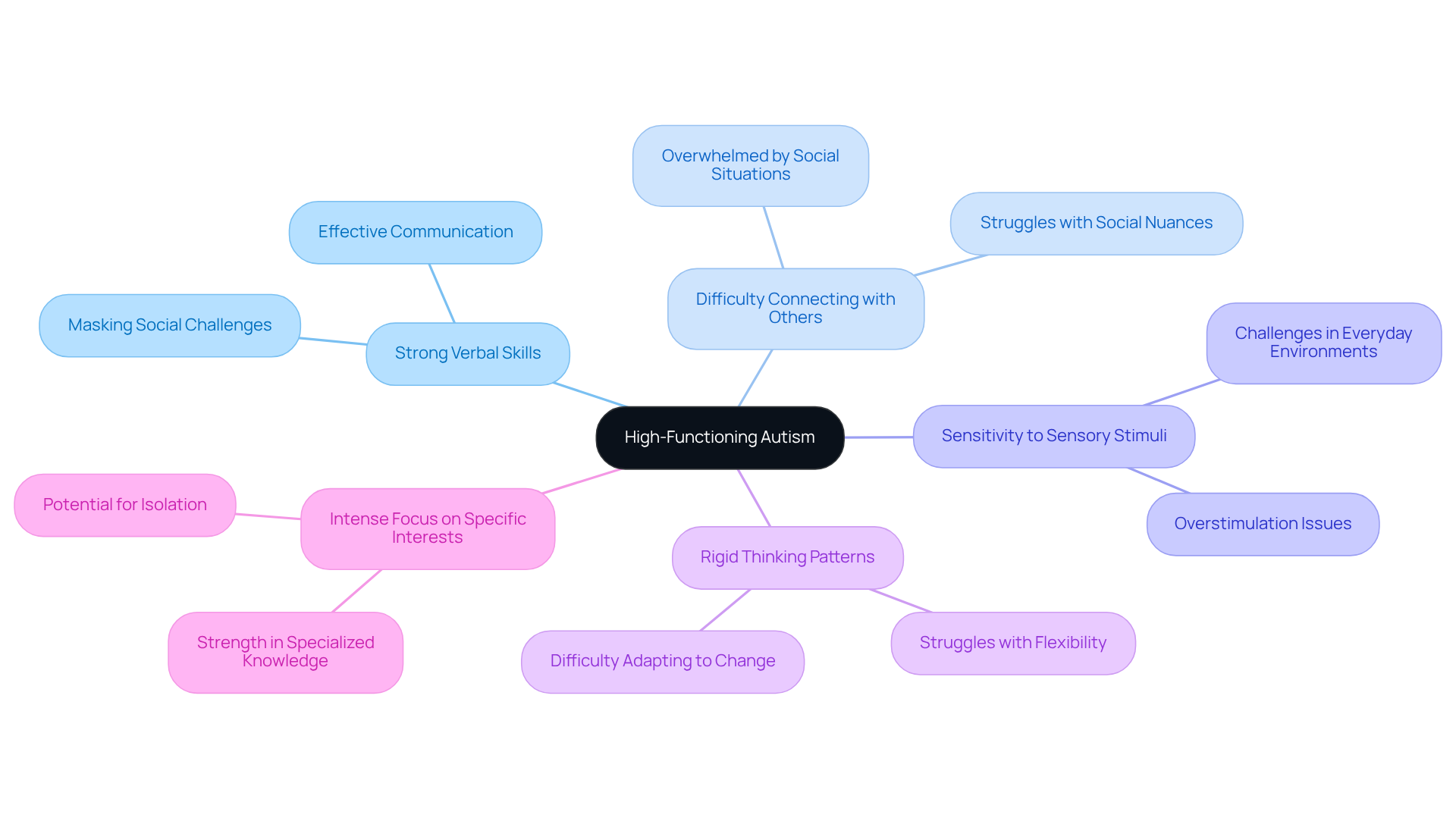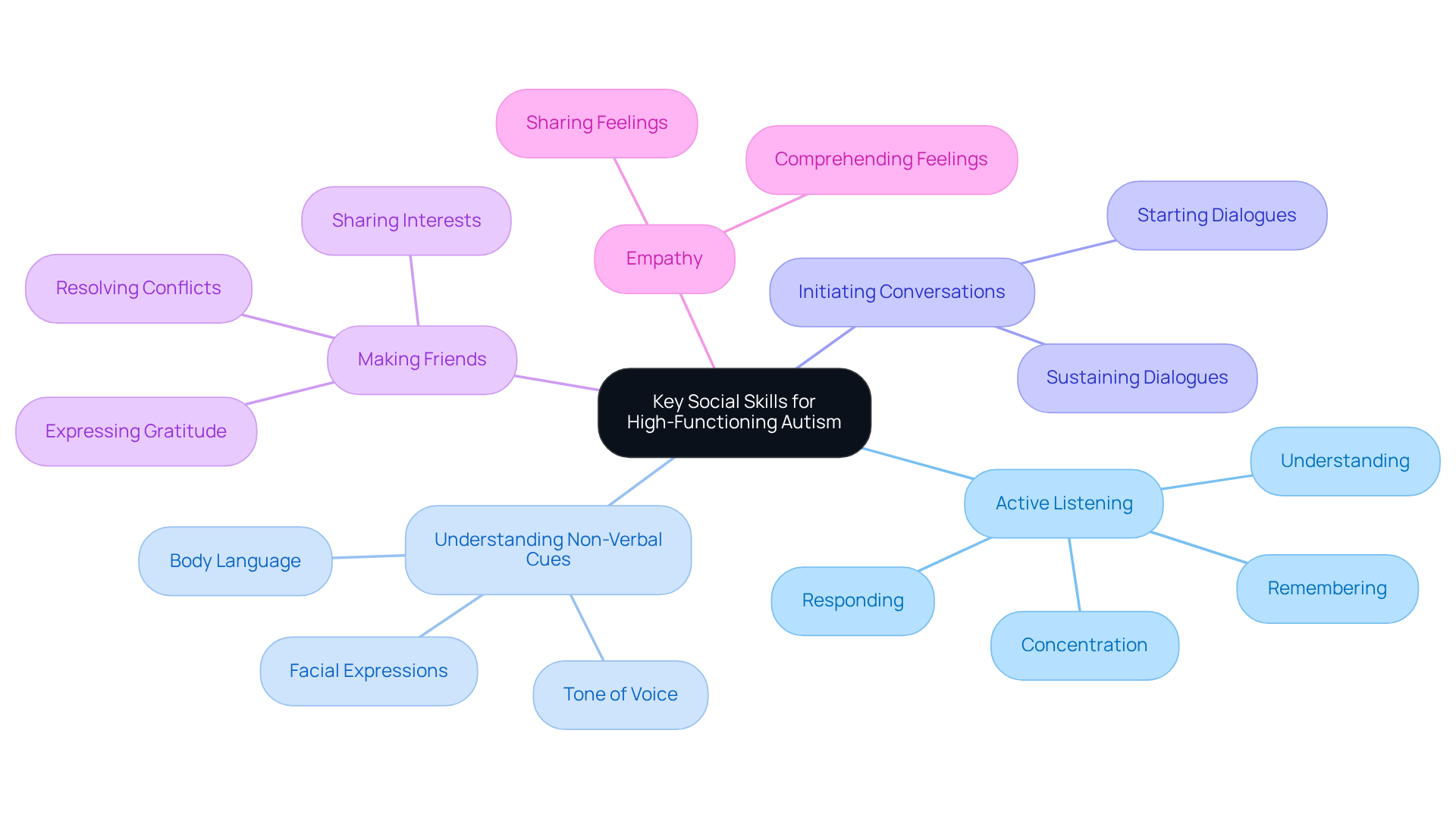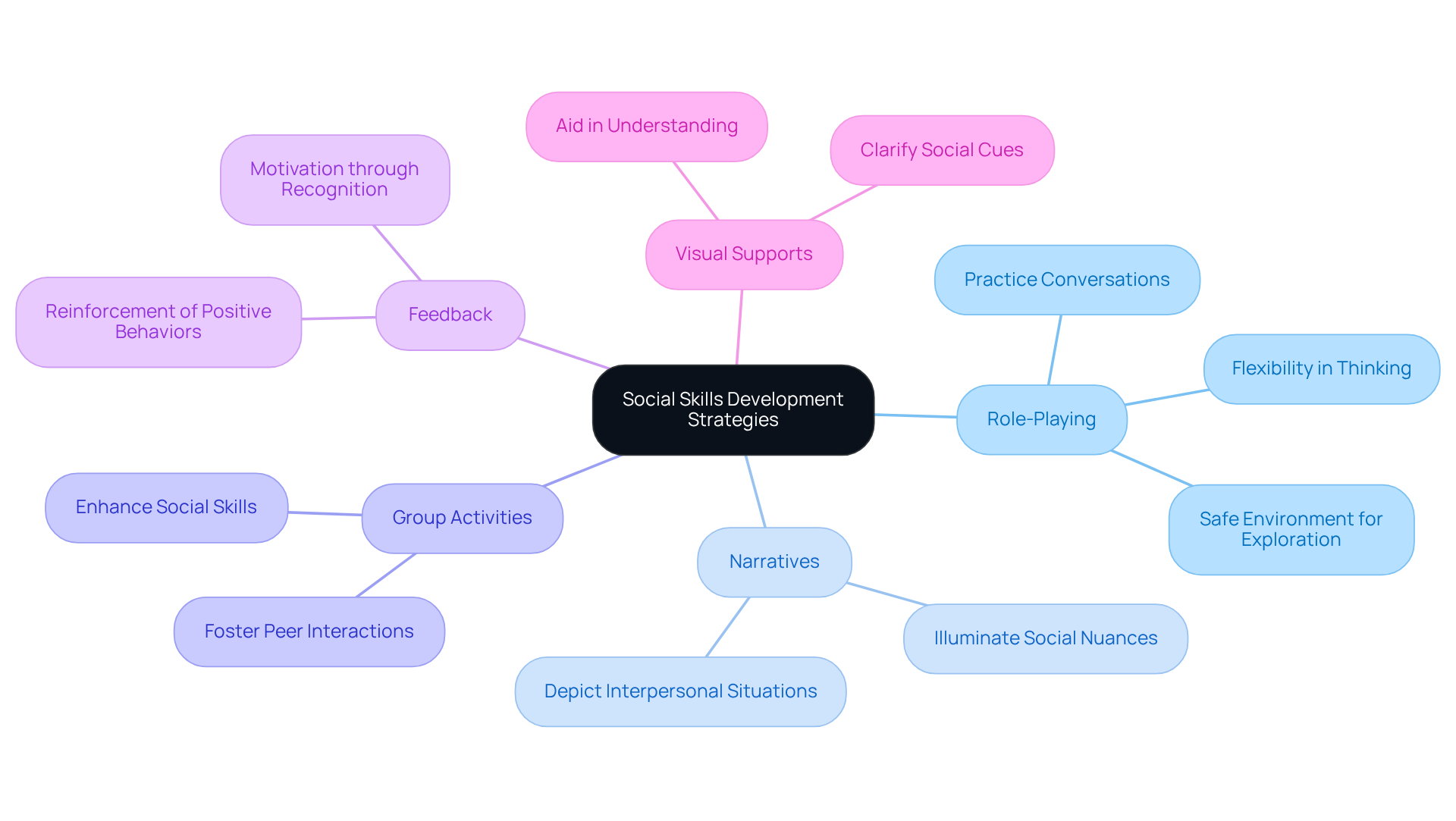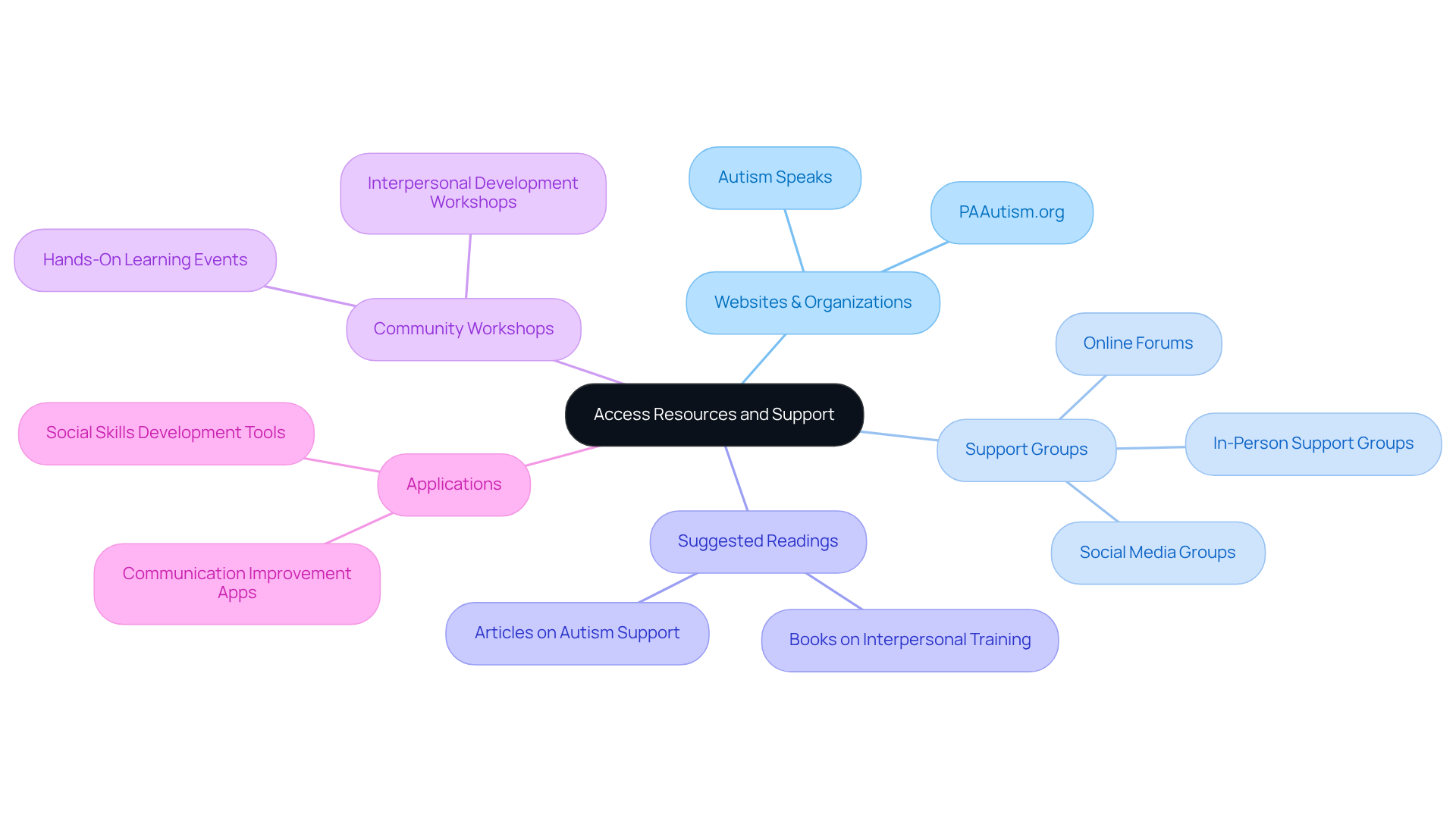Overview
For individuals with high-functioning autism, mastering essential social skills is a vital step towards building meaningful connections. These skills include:
- Active listening
- Understanding non-verbal cues
- Initiating conversations
- Making and maintaining friendships
- Fostering empathy
Each of these areas plays a crucial role in enhancing communication and emotional well-being.
As parents and caregivers, you may often wonder how to support your loved ones in developing these important skills. The journey can be challenging, but it is filled with opportunities for growth and connection. This article emphasizes that developing social skills is not just beneficial; it is essential for nurturing emotional health and fostering relationships.
To assist you in this developmental journey, we provide actionable strategies and resources designed specifically for parents and caregivers. By implementing these strategies, you can help your child navigate social interactions with confidence and ease. We encourage you to explore these resources and consider how they might fit into your unique situation.
Together, we can create a supportive environment that encourages growth and understanding. Your involvement is key to their success, and we invite you to share your experiences and insights as we navigate this path together.
Introduction
Understanding high-functioning autism (HFA) is essential for fostering meaningful connections in a world that can often feel overwhelming. While individuals with HFA may exhibit remarkable verbal skills, they frequently grapple with the subtleties of social interactions, which can lead to feelings of isolation. This article explores the vital social skills necessary for those on the autism spectrum, offering insights and strategies to enhance communication and relationship-building.
How can parents and caregivers effectively support their loved ones in navigating these complex social landscapes? By addressing these challenges together, we can create a more inclusive environment for everyone.
Define High-Functioning Autism and Its Characteristics
High-functioning autism (HFA) refers to individuals on the autism spectrum who possess average to above-average intelligence and can communicate effectively. Understanding this term is crucial for parents and caregivers seeking to support their loved ones.
Common characteristics of HFA include:
- Strong verbal skills, which can sometimes mask the challenges faced in social interactions.
- Difficulty connecting with others, often feeling overwhelmed by social situations.
- Sensitivity to sensory stimuli, which can be a significant hurdle, making everyday environments challenging.
- Rigid thinking patterns, leading to struggles with flexibility in thought and behavior.
- Intense focus on specific interests, which can be both a strength and a source of isolation.
These characteristics can profoundly impact the development of social skills. For instance, while strong verbal abilities might allow for effective communication, the nuances of social interactions can remain elusive. As parents, recognizing these dynamics is essential. By understanding the unique challenges associated with high-functioning autism, you can better support your child in developing social skills while navigating social landscapes. Consider seeking resources or connecting with support groups that can provide guidance and encouragement on this journey.

Identify Key Social Skills to Develop
- Active Listening: This vital skill involves fully concentrating, understanding, responding, and remembering what is being said. By promoting active listening, we can enhance communication and support the development of social skills for high-functioning autism, allowing individuals to engage meaningfully in discussions. It's important to note that approximately 40% of autistic children experience at least one comorbid anxiety disorder, making effective communication essential for navigating these challenges.
- Understanding and Using Non-Verbal Cues: Recognizing body language, facial expressions, and tone of voice plays a crucial role in effective communication. Mastering these non-verbal signals empowers those on the autism spectrum to interpret interpersonal situations more accurately and respond appropriately.
- Initiating and Maintaining Conversations: The ability to start and sustain a dialogue is essential for building meaningful relationships. By teaching social skills for high-functioning autism that include strategies for initiating conversations, we can empower individuals with autism to connect with peers and express their thoughts and feelings more freely.
- Making and Keeping Friends: Developing friendships is fundamental to emotional well-being. Skills such as sharing interests, expressing gratitude, and resolving conflicts contribute to building lasting friendships, which in turn enhance support networks. As Dr. Stephen Shore wisely notes, "Autism is really more of a difference that needs to be worked with rather than a monolithic enemy that needs to be slain or destroyed."
- Empathy and Emotional Understanding: Comprehending and sharing the feelings of others is a cornerstone of interpersonal interactions. Fostering empathy helps those with autism spectrum disorder improve their social skills for high-functioning autism, enabling them to navigate social complexities and forge stronger connections with others.
The importance of social skills for high-functioning autism cannot be overstated, as these interpersonal abilities significantly impact the quality of life and community integration for those on the autism spectrum. By focusing on these areas, parents and professionals can cultivate nurturing environments that foster growth and development in interactions. Together, we can create a supportive community that empowers individuals with autism and their families, aligning with the mission of ASD Media.

Implement Effective Strategies for Social Skills Development
Developing social skills is essential for fostering healthy relationships, and there are several actionable strategies that can help guide this journey:
- Consider role-playing scenarios to practice conversations. This method allows children to explore different interactions in a safe environment, building their confidence.
- Utilize narratives to depict interpersonal situations and suitable reactions. Storytelling can illuminate the nuances of social interactions, making them more relatable and understandable.
- Engage in group activities to foster peer interactions. These experiences provide opportunities for children to connect with others, which helps enhance their social skills for high-functioning autism.
- Offer feedback and reinforcement for positive interpersonal behaviors. Recognizing and celebrating small successes can motivate children to continue developing their skills.
- Use visual supports, like charts or diagrams, to clarify social cues. Visual aids can help children better understand and recognize important social signals.
Encourage regular practice in varied settings to generalize these skills. By integrating these strategies into daily life, you can help your child develop social skills for high-functioning autism, allowing them to navigate social situations with greater ease and confidence.

Access Resources and Support for Continued Growth
Explore a variety of resources designed specifically for parents and professionals in the autism community. Websites and organizations dedicated to autism support, such as Autism Speaks and PAAutism.org, offer valuable information and guidance to help you navigate this journey. Online forums and support groups serve as platforms for sharing experiences and strategies, creating a sense of community among parents facing similar challenges. In fact, research indicates that two-thirds of families with children on the autism spectrum have participated in autism-specific support groups, underscoring both the prevalence and potential benefits of such involvement.
Suggested readings, including books and articles focused on interpersonal training, can enhance understanding and provide practical methods to support your child. Community workshops and training events on interpersonal development present excellent opportunities for hands-on learning and connecting with other families who share your experiences. Additionally, consider utilizing applications and resources designed to improve communication and interpersonal interaction, which can be especially beneficial for children with social skills for high-functioning autism. Specific tools have been shown to enhance social skills and communication effectiveness.
Joining community groups can significantly enrich the experience of raising a child with developmental challenges, offering shared learning experiences and emotional support. Participation in these groups is linked to improved developmental outcomes, as they create a safe space for parents to connect and exchange resources. Research shows that being part of autism support groups fosters empowerment and well-being among parents, ultimately benefiting both parents and children. By engaging with these resources, families can cultivate an environment conducive to the development of social skills for high-functioning autism and overall growth. As ASD Media states, 'Our mission is to help improve the lives of children with ASD and their families with home and community-based ABA therapy.

Conclusion
Understanding and nurturing social skills development for individuals with high-functioning autism is vital for fostering meaningful connections and enhancing overall quality of life. It’s important to recognize that while these individuals may have strong verbal skills, they often encounter unique challenges in social interactions. By acknowledging these challenges and focusing on essential social skills, parents and caregivers can effectively support their loved ones in navigating social landscapes.
Key insights underscore the importance of:
- Active listening
- Interpreting non-verbal cues
- Initiating conversations
- Cultivating empathy
Each of these skills is crucial in building relationships and enhancing emotional well-being. Moreover, actionable strategies such as:
- Role-playing
- Utilizing visual supports
- Engaging with community resources
serve as effective methods for promoting social skills development. By implementing these strategies, families can create nurturing environments that encourage growth and connection.
Ultimately, the journey of supporting individuals with high-functioning autism in developing social skills is a collaborative effort that flourishes with community involvement and shared experiences. Engaging with support groups and leveraging available resources can significantly enrich this process. By fostering an inclusive and understanding environment, society can empower individuals with autism to thrive and connect, reinforcing the message that social skills are not only essential for personal development but also crucial for building a more empathetic and connected community.
Frequently Asked Questions
What is high-functioning autism (HFA)?
High-functioning autism (HFA) refers to individuals on the autism spectrum who possess average to above-average intelligence and can communicate effectively.
What are some common characteristics of high-functioning autism?
Common characteristics of HFA include strong verbal skills, difficulty connecting with others, sensitivity to sensory stimuli, rigid thinking patterns, and intense focus on specific interests.
How do strong verbal skills affect individuals with high-functioning autism?
Strong verbal skills can sometimes mask the challenges faced in social interactions, making it difficult for individuals to navigate social situations despite their ability to communicate effectively.
What challenges do individuals with high-functioning autism face in social situations?
Individuals with HFA often feel overwhelmed by social situations and may struggle to connect with others, which can hinder their development of social skills.
How does sensory sensitivity impact those with high-functioning autism?
Sensitivity to sensory stimuli can be a significant hurdle for individuals with HFA, making everyday environments challenging to navigate.
What role does rigid thinking play in high-functioning autism?
Rigid thinking patterns can lead to difficulties with flexibility in thought and behavior, which may affect how individuals with HFA respond to changes or new situations.
How can parents support children with high-functioning autism in developing social skills?
Parents can support their children by recognizing the unique challenges associated with HFA, seeking resources, and connecting with support groups for guidance and encouragement.




